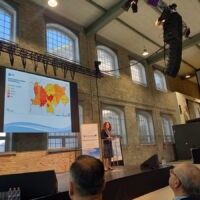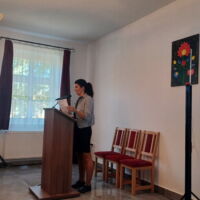EU integration of Ukraine across borders. International conference in Košice with the support of the International Visegrad Fund
Events + Knowledge sharing | 17 November 2023
Events + Knowledge sharing | 17 November 2023
The project is co-financed by the Governments of Czechia, Hungary, Poland and Slovakia through Visegrad Grants from International Visegrad Fund. The mission of the fund is to advance ideas for sustainable regional cooperation in Central Europe.
For more information please visit: www.visegradfund.org.
Within the framework of the annual events of the Association of European Border Regions (AEBR), with the financial support of the International Visegrad Fund, CESCI organised an international conference on the role of cross-border cooperation in EU integration of Ukraine with its project partners in Košice, on the 10th November 2023. A group of the participants took part in a study visit to Uzhhorod on the next day.
The AEBR held its annual events in Košice, this year. On the 8th November, the VIIth Cross-Border School took place at the rectorate of the Pavel Jozef Šafárik University with the active presence of Laurie Trautmann, Emmanuel Brunet-Jailly and David Newman professors. The speakers representing the academic, the tertiary educational and practitioners’ spheres presented papers on cross-border labour mobility and cooperation with Ukraine. Numerous Ukrainian speakers were present thanks to the co-organiser, the Research Institute on European Territorial Cooperation of the Uzhhorod National University. In the evening, CESCI offered dinner for the participants and AEBR members in the Pivovar Hoštinec.
The Tabačka Kulturfabrik provided the venue for the Executive Committee and General Assembly meetings of the AEBR, as well as, to the conference on cross-border labour market on the afternoon of 9 November. Both meetings were greeted by Rudolf Bauer, director of CESCI Carpathia, who was the main logistical manager of the event. The Gala Dinner offered by the Košice Self-Governing Region took place in the premises of the East Slovak Gallery.
The last two days were organised with the support of the International Visegrad Fund (IVF) through a project realised together by AEBR, CESCI, CESCI Carpathia, University of Prešov, Technical University of Liberec, WSB University and the National University of Uzhhorod. On the 10th November, an international conference took place in Hotel Yasmin. The participants were greeted by Mr Károly Pataky, vice-president of the Košice Self-Governing Region, Mr Karl-Heinz Lambertz, president of the AEBR and Mr Petr Mareš, director of the IVF. Mr Olivér Várhelyi, commissioner for enlargement and neighbourhood sent a video message, and Oleksandr Kopylenko, deputy chair of the Ukrainian Parliament’s Foreign Policy and Interparliamentary Cooperation Committee delivered his message online.
The first panel focused on the achievements Ukraine has made so far in the EU integration of the country. Mr Oleksandr Ilkov, director general of the Government Office for Coordination of European and Euro-Atlantic Integration of Ukraine highlighted that 92% of the Ukrainians support the integration process, so, these are the EU Member States which should be convinced on the advantages of Ukraine’s accession. Ms Myroslava Lendel, vice rector of the Uzhhorod National University, illustrated the important role that the universities play in the process, from the Euromaidan protests, to the Erasmus exchanges and the services facilitating the adaptation of the EU acquis. Professor Mykhailo Buromenskyi (Taras Shevchenko National University of Kyiv) gave an overview on the progress of legal harmonisation during which 90 acts have already been approved by the Ukrainian Parliament and further 20 are undergoing the same process. Professor Yaroslaw Lazur (Uzhhorod National University) concentrated on the rules enabling cross-border institutionalised cooperation for the local and regional municipalities.
The speakers of the second panel coming from the Visegrad countries shared their experiences of cross-border cooperation (CBC). Ms Zsuzsanna Fejes, president of CESCI (Hungary), Ms Joanna Kurowska-Pysz, associate professor of the WSB University (Poland) and Mr Hynek Böhm, associate professor of the Technical University of Liberec (Czechia) provided a comprehensive picture on the evolution and state-of-play of CBC in their countries. Mr Martin Lačný, vice-dean of the Faculty of Philosophy of the University of Prešov focused on the phenomena of mobility across the Slovak-Ukrainian border.
The rather academic contributions were nuanced with practical information given by the representatives of four operational cross-border structures of the following panel: the directors Ms Anna Palka (TRITIA EGTC), Ms Julianna Máté (Via Carpatia EGTC) and Ms Andrea Szabóné Cap (Tisza EGTC) presented the establishment process, the work and the achievements of their groupings. Mr Ondřej Havlíček told the story of the Neisse-Nisa-Nysa, the first Euroregion of the former Eastern Bloc established in 1991.
The conference ended with a round-table discussion generating numerous reflections on behalf of the audience. With the moderation of Martín Guillermo-Ramírez, secretary general of AEBR, the participants (Ms Nathalie Verschelde, deputy head of unit of the DG REGIO, Mr Eduard Buraš, former advisor of the Prime Minister of Slovakia, Mr Michal Lebduška, research fellow of the Czech Association for International Affairs, Mr Wojciech Opioła, assistant professor of the University of Opole and Mr Gyula Ocskay, secretary general of CESCI) recalled their memories on the EU accession, and shared their views on the main advantages of the EU integration.
After the conference, CESCI offered dinner for the speakers of the conference and the members of the Košice Platform.
At the last day, a group of the participants visited Uzhhorod by bus. The delegation arrived in Uzhhorod just in the moment of an air raid alert, so the meeting could not be held in the premises of the Transcarpathian Regional Council but in the building of the Uzhhorod National University. The participants were greeted there by Mr Viktor Mykyta, head of the Transcarpathian Regional Military Administration, who underlined that despite the war situation, the region managed to keep the democratic operation of its institutions. The next speaker was Mr Roman Saraj, president of the County Administration who briefly presented the region’s cross-border activities. Mr Ivan Myronyuk, vice rector of the Uzhhorod National University pointed at that this is the first university in Ukraine which established a research institute dedicated to cross-border cooperation. The activities of the institute were later presented by the director, Ms Yulia Fetko. Karl-Heinz Lambertz, president of the AEBR expressed his sympathy and acknowledgement towards the Ukrainian people and the region. He forecasted that the AEBR may deliver remarkable support once the war is ended. Mr Martín Guillermo-Ramírez, secretary general of AEBR made a proposal of opening a permanent representation of the Ukrainian regions in Brussels. The two final presenters were Ms Nataliya Nosa-Pylypenko, project manager of the Regional Innovation Agency of Uzhhorod and Mr Mihai Patrescu, general manager of the Satu Mare International Airport who spoke about the history of cross-border projects managed by the agency and the one being implemented in the field of light aviation. As a closure of the event, the participants discussed how the EU member regions can assist Ukraine both physically and politically.

 Recent B-solutions projects on water tourism
Recent B-solutions projects on water tourism